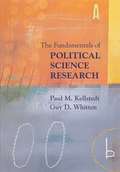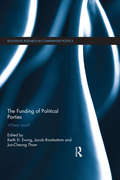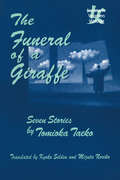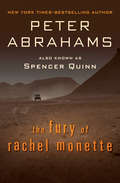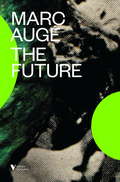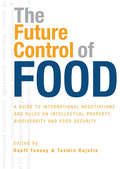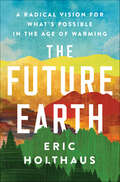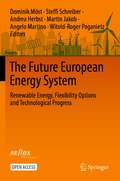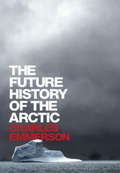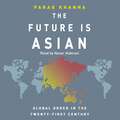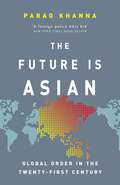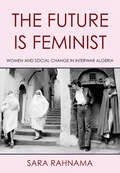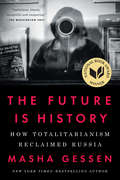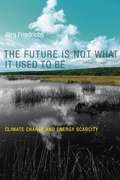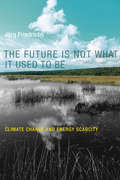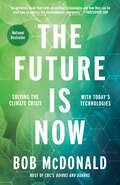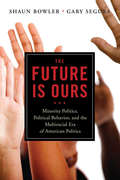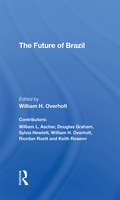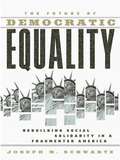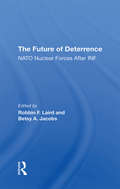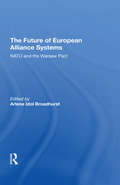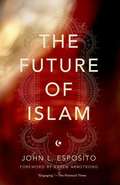- Table View
- List View
The Fundamentals of Political Science Research
by Paul M. Kellstedt Guy D. WhittenPaul M. Kellstedt's and Guy D. Whitten's The Fundamentals of Political Science Research provides an introduction to the scientific study of politics, supplying students with the basic tools needed to be both critical consumers and producers of scholarly research in political science. The book begins with a discussion of what it means to take a scientific approach to the study of politics. At the core of such an approach is the development of causal theories. Because there is no magic formula by which theories are developed, the authors present a series of strategies and develop an integrated approach to research design and empirical analyses that allows students to determine the plausibility of their causal theories. The text's accessible presentation of mathematical concepts and regression models with two or more independent variables is a key component to this process, along with the integration of examples from political science and the real world to help students grasp the fundamental concepts.
The Fundamentals of Political Science Research
by Paul M. Kellstedt Guy D. WhittenPaul M. Kellstedt's and Guy D. Whitten's The Fundamentals of Political Science Research provides an introduction to the scientific study of politics, supplying students with the basic tools needed to be both critical consumers and producers of scholarly research in political science. The book begins with a discussion of what it means to take a scientific approach to the study of politics. At the core of such an approach is the development of causal theories. Because there is no magic formula by which theories are developed, the authors present a series of strategies and develop an integrated approach to research design and empirical analyses that allows students to determine the plausibility of their causal theories. The text's accessible presentation of mathematical concepts and regression models with two or more independent variables is a key component to this process, along with the integration of examples from political science and the real world to help students grasp the fundamental concepts.
The Fundamentals of Political Science Research
by Paul M. Kellstedt Guy D. WhittenReligious ideas and actors have shaped Asian cultural practices for millennia and have played a decisive role in charting the course of its history. In this engaging and informative book, Thomas David DuBois sets out to explain how religion has influenced the political, social, and economic transformation of Asia from the fourteenth century to the present. Crossing a broad terrain from Tokyo to Tibet, the book highlights long-term trends and key moments, such as the expulsion of Catholic missionaries from Japan, or the Taiping Rebellion in China, when religion dramatically transformed the political fate of a nation. Contemporary chapters reflect on the wartime deification of the Japanese emperor, Marxism as religion, the persecution of the Dalai Lama, and the fate of Asian religion in a globalized world.
The Fundamentals of Political Science Research
by Paul M. Kellstedt Guy D. WhittenThe third edition of the best-selling The Fundamentals of Political Science Research provides an introduction to the scientific study of politics. It offers the basic tools necessary for readers to become both critical consumers and beginning producers of scientific research on politics. The authors present an integrated approach to research design and empirical analyses whereby researchers can develop and test causal theories. They use examples from political science research that students will find interesting and inspiring, and that will help them understand key concepts. The book makes technical material accessible to students who might otherwise be intimidated by mathematical examples. This revised third edition features new 'Your Turn' boxes meant to engage students. The edition also has new sections added throughout the book to enhance the content's clarity and breadth of coverage.
The Funding of Political Parties: Where Now? (Routledge Research in Comparative Politics)
by Jacob Rowbottom Keith D. Ewing Joo-Cheong ThamThis book explores the problems associated with regulating the funding of political parties and election campaigns in a timely assessment of a topic of great political controversy. From interest in Obama's capacity to raise vast sums of money, to scandals that have rocked UK and Australian governments, party funding is a global issue, reflected in this text with case studies from Australia, Canada, New Zealand, United Kingdom, and the United States. Taking an interdisciplinary approach with leading scholars from politics, geography and law, this text addresses key themes: contributions, spending controls, the role of broadcasters and special interests, and the role of the state in funding political parties. With regulatory measures apparently unable to change the behaviour of parties, why have existing laws failed to satisfy the demands for reform, and what kind of laws are necessary to change the way political parties behave? The Funding of Political Parties: Where Now? brings fresh comparative material to inform this topical and intractable debate, and assesses the wider implications of continuing problems in political funding. This book will be of interest to students and scholars of political science, political theory, policy and law.
The Funeral of a Giraffe: Seven Stories
by Taeko Tomioka Kyoko Iriye Selden Noriko MizutaA collection of short stories by scriptwriter-poet turned fiction writer Taeko Tomioka. Taeko deconstructs the discourse of the nuclear family and heterosexuality in gendered Japanese culture. Her stories focus on ordinary people unfettered by introspection or a search for life's ultimate meaning.
The Fury of Rachel Monette
by Peter AbrahamsA woman must untangle a dark enigma that dates back to World War II in order to find her kidnapped son in this riveting international thriller from Peter Abrahams, aka Spencer Quinn, author of the Chet and Bernie Mysteries Rachel Monette arrives home to a scene of unspeakable violence: Her French-born husband, Dan, is dead--the victim of a savage stabbing--and her five-year-old son is missing. A neighbor claims she saw a rabbi taking Adam away. But there are no synagogues in Williamstown. The only clue is a letter Rachel finds in Dan's safety deposit box. Written in 1942, it's about the reassignment of three German soldiers to a place called Camp Siegfried in the supposedly unoccupied western part of North Africa. Convinced that the murder and abduction are related to a book Dan recently completed about German-occupied countries during World War II, Rachel travels to North Africa and then on to Israel, where a mass murderer hiding in plain sight is determined to keep the horrors of the past buried forever.
The Future
by John Howe Marc AugeFor Marc Augé, best-selling author of Non-Places, the prevailing idea of "the Future" rests on our present fears of the contemporary world. It is to the future that we look for redemption and progress; but it is also where we project our personal and apocalyptic anxieties. By questioning notions of certainty, truth, and totality, Augé finds ways to separate the future from our eternal, terrified present and liberates the mind to allow it to conceptualize our possible futures afresh.From the Trade Paperback edition.
The Future Control of Food: A Guide to International Negotiations and Rules on Intellectual Property, Biodiversity and Food Security
by Geoff Tansey Tasmin RajotteThis book is the first wide-ranging guide to the key issues of intellectual property and ownership, genetics, biodiversity and food security. Proceeding from an introduction and overview of the issues, comprehensive chapters cover negotiations and instruments in the World Trade Organization, Convention on Biological Diversity, UN Food and Agriculture Organization, World Intellectual Property Organization, the International Union for the Protection of New Varieties of Plants and various other international bodies. The final part discusses the responses of civil society groups to the changing global rules, how these changes affect the direction of research and development, the nature of global negotiation processes and various alternative futures. Published with IDRC and QIAP.
The Future Earth: A Radical Vision for What's Possible in the Age of Warming
by Eric HolthausThe first hopeful book about climate change, The Future Earth shows readers how to reverse the short- and long-term effects of climate change over the next three decades.The basics of climate science are easy. We know it is entirely human-caused. Which means its solutions will be similarly human-led. In The Future Earth, leading climate change advocate and weather-related journalist Eric Holthaus (“the Rebel Nerd of Meteorology”—Rolling Stone) offers a radical vision of our future, specifically how to reverse the short- and long-term effects of climate change over the next three decades. Anchored by world-class reporting, interviews with futurists, climatologists, biologists, economists, and climate change activists, it shows what the world could look like if we implemented radical solutions on the scale of the crises we face. What could happen if we reduced carbon emissions by 50 percent in the next decade?What could living in a city look like in 2030?How could the world operate in 2040, if the proposed Green New Deal created a 100 percent net carbon-free economy in the United States?This is the book for anyone who feels overwhelmed by the current state of our environment. Hopeful and prophetic, The Future Earth invites us to imagine how we can reverse the effects of climate change in our own lifetime and encourages us to enter a deeper relationship with the earth as conscientious stewards and to re-affirm our commitment to one another in our shared humanity.
The Future European Energy System: Renewable Energy, Flexibility Options and Technological Progress
by Dominik Möst Steffi Schreiber Andrea Herbst Martin Jakob Angelo Martino Witold-Roger PoganietzThis open access book analyzes the transition toward a low-carbon energy system in Europe under the aspects of flexibility and technological progress. By covering the main energy sectors – including the industry, residential, tertiary and transport sector as well as the heating and electricity sector – the analysis assesses flexibility requirements in a cross-sectoral energy system with high shares of renewable energies. The contributing authors – all European energy experts – apply models and tools from various research fields, including techno-economic learning, fundamental energy system modeling, and environmental and social life cycle as well as health impact assessment, to develop an innovative and comprehensive energy models system (EMS). Moreover, the contributions examine renewable penetrations and their contributions to climate change mitigation, and the impacts of available technologies on the energy system. Given its scope, the book appeals to researchers studying energy systems and markets, professionals and policymakers of the energy industry and readers interested in the transformation to a low-carbon energy system in Europe.
The Future History of the Arctic
by Charles EmmersonLong at the margins of global affairs and at the edge of our mental map of the world, the Arctic has found its way to the center of the issues which will challenge and define our world in the twenty-first century: energy security and the struggle for natural resources, climate change and its uncertain speed and consequences, the return of great power competition, the remaking of global trade patterns... In The Future History of the Arctic, geopolitics expert Charles Emmerson weaves together the history of the region with reportage and reflection, revealing a vast and complex area of the globe, loaded with opportunity and rich in challenges. He defines the forces which have shaped the Arctic’s history and introduces the players in politics, business, science and society who are struggling to mold its future. The Arctic is coming of age. This engrossing book tells the story of how that is happening and how it might happen-through the stories of those who live there, those who study it, and those who will determine its destiny.
The Future Is Asian: Global Order in the Twenty-first Century
by Parag KhannaFive billion people, two-thirds of the world's mega-cities, one-third of the global economy, two-thirds of global economic growth, thirty of the Fortune 100, six of the ten largest banks, eight of the ten largest armies, five nuclear powers, massive technological innovation, the newest crop of top-ranked universities. Asia is also the world's most ethnically, linguistically and culturally diverse region of the planet, eluding any remotely meaningful generalization beyond the geographic label itself. Even for Asians, Asia is dizzying to navigate.Whether you gauge by demography, geography, economy or any other metric, Asia is already the present - and it is certainly the future. It is for this reason that we cannot afford to continue to get Asia so wrong. The Future Is Asian accurately shows Asia from the inside-out, telling the story of how this mega-region is coming together and reshaping the entire planet in the process.
The Future Is Asian: Global Order in the Twenty-first Century
by Parag KhannaFive billion people, two-thirds of the world's mega-cities, one-third of the global economy, two-thirds of global economic growth, thirty of the Fortune 100, six of the ten largest banks, eight of the ten largest armies, five nuclear powers, massive technological innovation, the newest crop of top-ranked universities. Asia is also the world's most ethnically, linguistically and culturally diverse region of the planet, eluding any remotely meaningful generalization beyond the geographic label itself. Even for Asians, Asia is dizzying to navigate.Whether you gauge by demography, geography, economy or any other metric, Asia is already the present - and it is certainly the future. It is for this reason that we cannot afford to continue to get Asia so wrong. The Future Is Asian accurately shows Asia from the inside-out, telling the story of how this mega-region is coming together and reshaping the entire planet in the process.
The Future Is Feminist: Women and Social Change in Interwar Algeria
by Sara RahnamaThe Future Is Feminist by Sara Rahnama offers a closer look at a pivotal moment in Algerian history when Algerians looked to feminism as a path out of the stifling realities of French colonial rule. Algerian people focused outward to developments in the Middle East, looking critically at their own society and with new eyes to Islamic tradition. In doing so, they reordered the world on their own terms—pushing back against French colonial claims about Islam's inherent misogyny. Rahnama describes how Algerians took inspiration from Middle Eastern developments in women's rights. Empowered by the Muslim reform movement sweeping the region, they read Islamic knowledge with new eyes, even calling Muhammad "the first Arab feminist." They compared the blossoming women's rights movements across the Middle East and this history of Islam's feminist potential to the stifled position of Algerian women, who suffered from limited access to education and respectable work. Local dynamics also shaped these discussions, including the recent entry of thousands of Algerian women into the workforce as domestic workers in European settler homes. While Algerian people disagreed about whether Algeria's future should be colonial or independent, they agreed that women's advancement would offer a path forward for Muslim society toward a more prosperous future. Through its use of Arabic-language sources alongside French ones, The Future Is Feminist moves beyond Algeria's colonial relationship to France to illuminate its relationship to the Middle East.
The Future Is History: How Totalitarianism Reclaimed Russia
by Masha GessenLonglisted for the 2017 National Book Award in NonfictionPutin’s bestselling biographer reveals how, in the space of a generation, Russia surrendered to a more virulent and invincible new strain of autocracy. Hailed for her “fearless indictment of the most powerful man in Russia” (The Wall Street Journal), award-winning journalist Masha Gessen is unparalleled in her understanding of the events and forces that have wracked her native country in recent times. In The Future Is History, she follows the lives of four people born at what promised to be the dawn of democracy. Each of them came of age with unprecedented expectations, some as the children and grandchildren of the very architects of the new Russia, each with newfound aspirations of their own—as entrepreneurs, activists, thinkers, and writers, sexual and social beings. Gessen charts their paths against the machinations of the regime that would crush them all, and against the war it waged on understanding itself, which ensured the unobstructed reemergence of the old Soviet order in the form of today’s terrifying and seemingly unstoppable mafia state. Powerful and urgent, The Future Is History is a cautionary tale for our time and for all time.
The Future Is Not What It Used to Be
by Jörg FriedrichsThe future is not what it used to be because we can no longer rely on the comfortingassumption that it will resemble the past. Past abundance of fuel, for example, does not implyunending abundance. Infinite growth on a finite planet is not possible. In thisbook, Jrg Friedrichs argues that industrial society itself is transitory, and he examines theprospects for our civilization's coming to terms with its two most imminent choke points: climatechange and energy scarcity. He offers a thorough and accessible account of these two challenges aswell as the linkages between them. Friedrichs contends that industrialcivilization cannot outlast our ability to burn fossil fuels and that the demise of industrialsociety would entail cataclysmic change, including population decreases. To understand the socialand political implications, he examines historical cases of climate stress and energy scarcity:devastating droughts in the ancient Near East; the Little Ice Age in the medieval Far North; theJapanese struggle to prevent "fuel starvation" from 1918 to 1945; the "totalitarianretrenchment" of the North Korean governing class after the end of Soviet oil deliveries; andCuba's socioeconomic adaptation to fuel scarcity in the 1990s. He draws important lessons about thelikely effects of climate and energy disruptions on different kinds ofsocieties. The warnings of climate scientists are met by denial and inaction,while energy experts offer little guidance on the effects of future scarcity. Friedrichs suggeststhat to confront our predicament we must affirm our core values and take action to transform our wayof life. Whether we are private citizens or public officials, complacency is not an option: climatechange and energy scarcity are emerging facts of life.
The Future Is Not What It Used to Be: Climate Change and Energy Scarcity
by Jorg FriedrichsA hard look at the twin challenges of climate change and energy scarcity that examines historical precedents and allows no room for complacency.The future is not what it used to be because we can no longer rely on the comforting assumption that it will resemble the past. Past abundance of fuel, for example, does not imply unending abundance. Infinite growth on a finite planet is not possible. In this book, Jörg Friedrichs argues that industrial society itself is transitory, and he examines the prospects for our civilization's coming to terms with its two most imminent choke points: climate change and energy scarcity. He offers a thorough and accessible account of these two challenges as well as the linkages between them.Friedrichs contends that industrial civilization cannot outlast our ability to burn fossil fuels and that the demise of industrial society would entail cataclysmic change, including population decreases. To understand the social and political implications, he examines historical cases of climate stress and energy scarcity: devastating droughts in the ancient Near East; the Little Ice Age in the medieval Far North; the Japanese struggle to prevent “fuel starvation” from 1918 to 1945; the “totalitarian retrenchment” of the North Korean governing class after the end of Soviet oil deliveries; and Cuba's socioeconomic adaptation to fuel scarcity in the 1990s. He draws important lessons about the likely effects of climate and energy disruptions on different kinds of societies.The warnings of climate scientists are met by denial and inaction, while energy experts offer little guidance on the effects of future scarcity. Friedrichs suggests that to confront our predicament we must affirm our core values and take action to transform our way of life. Whether we are private citizens or public officials, complacency is not an option: climate change and energy scarcity are emerging facts of life.
The Future Is Now: Solving the Climate Crisis with Today's Technologies
by Bob McDonaldIs a global pandemic what it took to show us that saving our planet is possible?In the absence of motorized boats and gondolas, Venice&’s waters have returned to a sparkling blue color. Deer have been spotted roaming cities in Italy, and mountain goats recently took over a small seaside town in Wales. Taking advantage of the decreased boat traffic, whales have returned to roaming Vancouver&’s harbours. The absence of &“regular&” human activities has dramatically affected our environment. In this book, Bob McDonald turns his focus to global energy sources, and shows how the global shutdowns may have been exactly what we needed to show us that a greener future is achievable. This is not another &“wake-up call,&” and not another plea to heed the climate science. This is an exploration of the incredible technologies that our species can use to get out of the mess we&’ve made for ourselves. It is a work of immense optimism, to counteract the sense of doom that hangs over most discussions of the environment. Many alternative energy sources such as wind, solar, and geothermal have been available for decades—but they alone will not be enough. Additional power will come from small nuclear reactors the size of an office desk, and space-based solar power satellites with enormous mirrors that can capture sunlight, convert it to microwaves, and beam it to the ground to light up entire cities. Energy will be captured from waves, tides, and hydrogen. Vehicles will no longer have tailpipes that emit smog particles. Food will be sourced locally. Green technology is one of the fastest growing sectors of the economy, and will only continue to skyrocket as current products improve their performance and new products emerge. A new green age is upon us--let this book be your guide to the future.
The Future Is Ours: Minority Politics, Political Behavior, and the Multiracial Era of American Politics
by Gary M. Segura Dr Shaun BowlerToday's demographic reality is a "majority-minority" America wherein racial and ethnic minorities comprise a growing share of the U.S. population and electorate, and are themselves becoming more diverse and representing more decisive votes. How America evolves as a society and a polity depends on whether and how these new Americans access and are accommodated by existing institutions. The Future is Ours offers a data-based examination of whether (and exactly how) minority citizens differ from members of the white majority—in political participation, voting preferences, policy opinions, orientations toward government, and legislative representation. Data analyses are presented in non-technical fashion, but throughout the authors attempt to engage issues of research design that expose students to the logics of social science inquiry. Bowler and Segura argue that demography will, in fact, be destiny. The balance between the two parties is at a tipping point and the outcome depends on how minority Americans engage in politics.
The Future Of Brazil
by William H. OverholtThis book analyzes Brazil's foreign relations, politics, domestic economy, international economic relations, and relations with multinational corporations. It identifies the balance-of-payments crisis in the late 1970s as the key to Brazil's economic and political future.
The Future Of Democratic Equality: Rebuilding Social Solidarity in a Fragmented America
by Joseph M. Schwartz2011 David Easton Award, presented for the best book by the Foundations of Political Theory section of APSA: "The Future of Democratic Equality, by Joseph Schwartz, takes on three tasks, and accomplishes all brilliantly. Any one of these tasks well fulfilled would have been a laudable achievement. First, Schwartz argues for the centrality of the question of equality to democratic politics. Second, he critically analyzes and explains the shocking rise in inequality in the United States over the last three decades. This he does with conceptual clarity, rich interdisciplinary analysis, and a thorough examination of hard socioeconomic data. Third, he assails the near absence of concern for this soaring inequality among contemporary political theorists, and offers a cogent, and stinging, explanation that takes to task the discipline’s preoccupation with difference and identity severed from the pragmatics of democratic equality. The Future of Democratic Equality is a courageous and disciplined effort to tackle a hugely important political problem and intellectual puzzle. It well embodies the spirit of the Easton Book Award by providing well-grounded normative theory targeted to an urgent matter of contemporary concern. It is a must read for anyone who cares about democracy." - Respectfully submitted by Leslie Paul Thiele, University of Florida (chair) and Cary J. Nederman, Texas A&M University Why has contemporary radical political theory remained virtually silent about the stunning rise in inequality in the United States over the past thirty years? Schwartz contends that since the 1980s, most radical theorists shifted their focus away from interrogating social inequality to criticizing the liberal and radical tradition for being inattentive to the role of difference and identity within social life. This critique brought more awareness of the relative autonomy of gender, racial, and sexual oppression. But, as Schwartz argues, it also led many theorists to forget that if difference is institutionalized on a terrain of radical economic inequality, unjust inequalities in social and political power will inevitably persist. Schwartz cautions against a new radical theoretical orthodoxy: that "universal" norms such as equality and solidarity are inherently repressive and homogenizing, whereas particular norms and identities are truly emancipatory. Reducing inequality among Americans, as well as globally, will take a high level of social solidarity--a level far from today's fragmented politics. In focusing the left's attention on the need to reconstruct a governing model that speaks to the aspirations of the majority, Schwartz provocatively applies this vision to such real world political issues as welfare reform, race relations, childcare, and the democratic regulation of the global economy.
The Future Of Deterrence: Nato Nuclear Forces After Inf
by Robbin F Laird Betsy JacobsThe editors would like to express their thanks to a number of colleagues whose insights and comments contributed to the development of the book. Among those who were particularly helpful were Robert Nurick, Vic Utgoff, Mike Clarke, Jorg Baldouf, Jean Chabaud, John Roper, Edwina Moreton, Lawrence Freedman, Francois Heisbourg, and Harley Balzer. We are particularly grateful to General William Y. Smith, President of the Institute for Defense Analyses, for his intellectual encouragement.
The Future Of European Alliance Systems: NATO And The Warsaw Pact
by Arlene Idol BroadhurstRecent events in Afghanistan and Poland, as well as the Twenty-Sixth Party Congress, have raised questions about the future direction of the Warsaw Treaty Organization. Similarly, pressing issues such as the placement of long-range theater nuclear forces, burden sharing, and threats to the security of Europe from peripheral areas (for instance, the Middle East) call attention to the urgent need for a re-examination of priorities and strategies within the North Atlantic Treaty Organization. This book addresses these military considerations, as well as the political and social dimensions of European security. The distinguished authors discuss four major subjects--European security perspectives, NATO, the warsaw Pact, and resource allocations for defense--within the framework of comparative alliance approaches. Their detailed descriptions of current problems, diversities, and discussions within the two alliance systems offer insight into the differing ideas of what constitutes security.
The Future Of Islam
by John L. EspositoJohn L. Esposito is one of America's leading authorities on Islam. In this brilliant portrait of Islam today - and tomorrow - he draws on a lifetime of thought and research to provide an accurate, richly nuanced, and revelatory account of the fastest growing religion in the world. Here Esposito explores the major questions and issues that face Islam in the 21st century and that will deeply affect global politics: Is Islam compatible with modern notions of democracy, rule of law, gender equality, and human rights? How representative and widespread is Islamic fundamentalism andthe threat of global terrorism? Can Muslim minority communities be loyal citizens in America and Europe? In the midst of these questions Esposito places an important emphasis on the issue of Islamophobia, the threat it poses, and its vast impact on politics and society in the US and Europe. He also turns the mirror on the US and Europe and paints a revealing portrait of how we appear to Muslims. Recent decades have brought extraordinary changes in the Muslim world, and in addressing these issues, Esposito paints a complex picture of Islam in all its diversity - a picture of urgent importance as we face the challenges of the coming century.
